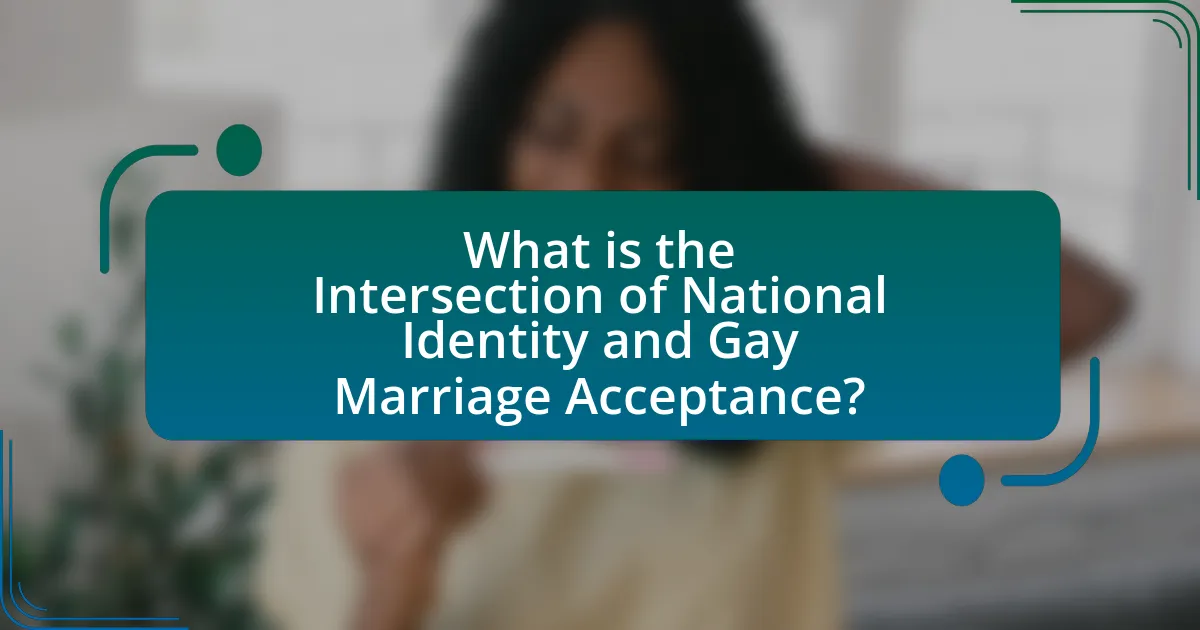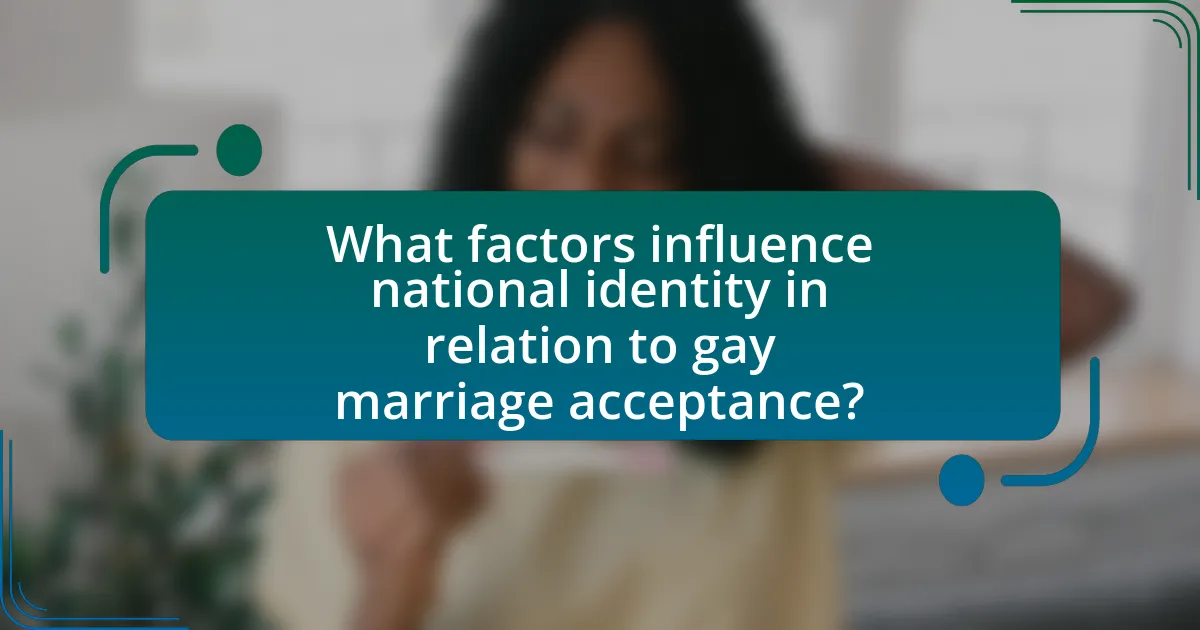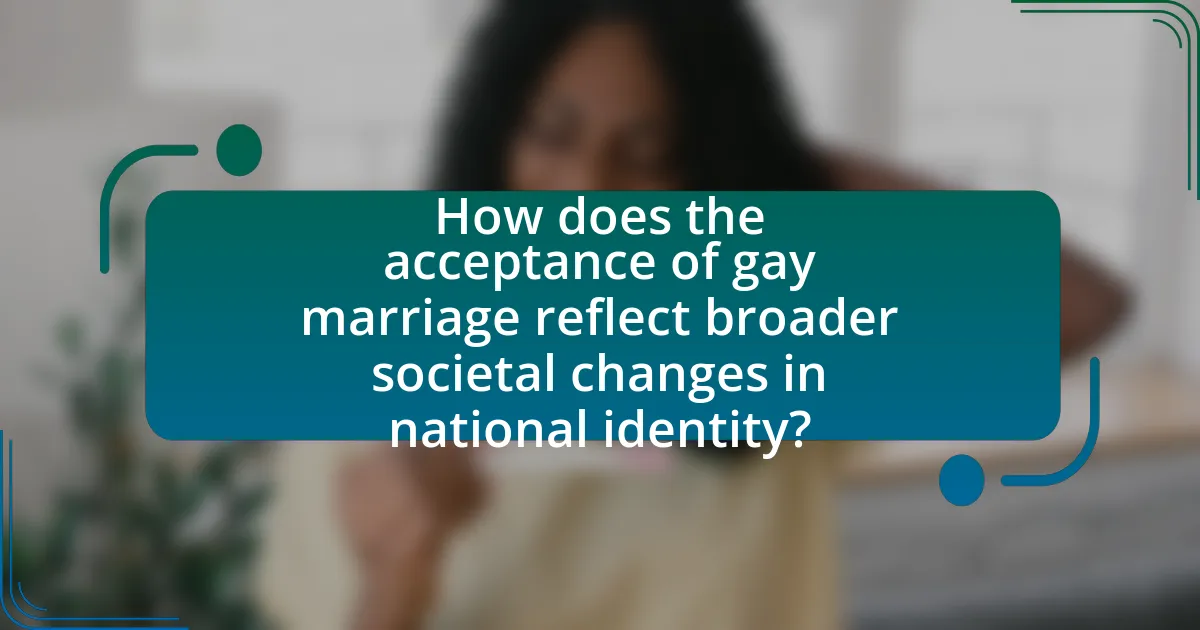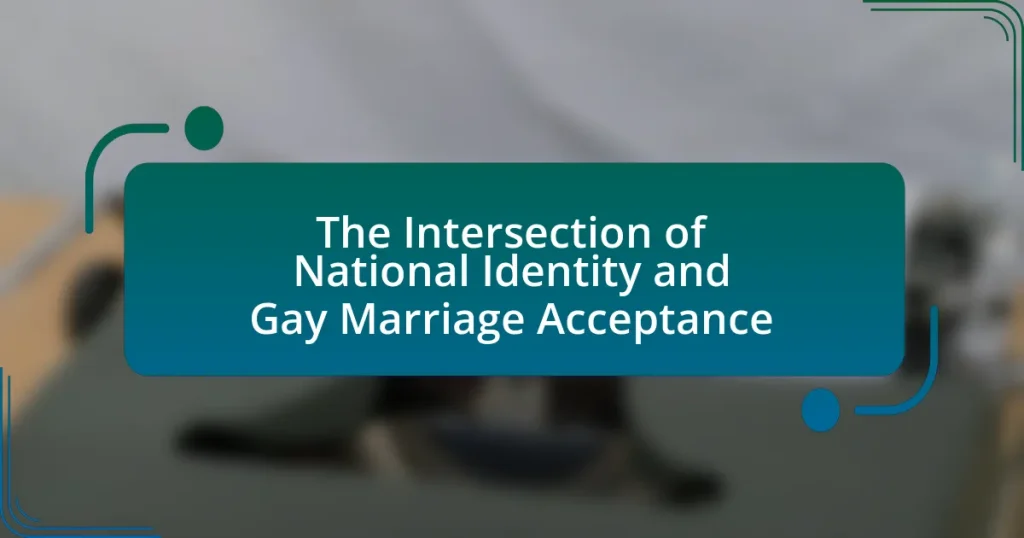The article examines the intersection of national identity and gay marriage acceptance, highlighting how cultural values and societal norms influence attitudes toward LGBTQ+ rights across different nations. It discusses the correlation between a country’s national identity—shaped by factors such as religion, education, and historical events—and its stance on gay marriage, noting that progressive nations tend to show higher acceptance. The article also explores the role of cultural context, social movements, and media representation in shaping public opinion and policy-making regarding gay marriage, emphasizing the implications for social cohesion and inclusivity.

What is the Intersection of National Identity and Gay Marriage Acceptance?
The intersection of national identity and gay marriage acceptance lies in how cultural values and societal norms shape attitudes toward LGBTQ+ rights within a nation. In countries where national identity is closely tied to traditional values, such as many in Eastern Europe and parts of Africa, acceptance of gay marriage tends to be lower, reflecting a resistance to change in societal norms. Conversely, nations like Canada and the Netherlands, which embrace progressive values as part of their national identity, show higher levels of acceptance for gay marriage, evidenced by legal recognition and societal support. Studies, such as those conducted by the Pew Research Center, indicate that public opinion on gay marriage is often influenced by factors like religion, education, and exposure to diverse cultures, further illustrating the complex relationship between national identity and the acceptance of gay marriage.
How do national identity and gay marriage acceptance relate to each other?
National identity and gay marriage acceptance are closely related, as a country’s cultural values and historical context significantly influence its stance on LGBTQ+ rights. For instance, nations with a strong emphasis on individualism and human rights, such as Canada and the Netherlands, tend to show higher acceptance of gay marriage, reflecting their national identity that prioritizes equality and personal freedoms. Conversely, countries with collectivist cultures or conservative religious influences, like many in the Middle East, often exhibit lower acceptance levels, as their national identity is intertwined with traditional values that resist changes to marriage norms. This correlation is supported by studies indicating that public attitudes towards gay marriage often mirror broader national identity narratives, highlighting the interplay between societal values and legal recognition of LGBTQ+ rights.
What role does cultural context play in shaping national identity regarding gay marriage?
Cultural context significantly influences national identity regarding gay marriage by shaping societal norms, values, and legal frameworks. In countries where cultural attitudes are more accepting of LGBTQ+ rights, such as in many Western nations, national identity often incorporates inclusivity and equality, leading to the legalization of gay marriage. For instance, the legalization of same-sex marriage in the Netherlands in 2001 reflected a cultural shift towards progressive values, reinforcing a national identity that prioritizes human rights. Conversely, in cultures with conservative views on sexuality, such as in parts of Africa and the Middle East, national identity may be closely tied to traditional beliefs, resulting in resistance to gay marriage and the marginalization of LGBTQ+ individuals. This dynamic illustrates how cultural context not only shapes public opinion but also informs the legal and political landscape surrounding gay marriage, ultimately defining national identity.
How do historical events influence the acceptance of gay marriage within national identities?
Historical events significantly shape the acceptance of gay marriage within national identities by altering societal norms and legal frameworks. For instance, the Stonewall Riots of 1969 in the United States marked a pivotal moment in the LGBTQ+ rights movement, leading to increased visibility and advocacy for gay rights, which ultimately influenced public opinion and legislative changes favoring marriage equality. Additionally, countries that have experienced significant social movements, such as the legalization of same-sex marriage in the Netherlands in 2001, often see a ripple effect, where other nations observe and adapt similar policies, reflecting a shift in national identity towards inclusivity. This correlation between historical milestones and evolving attitudes is evident in various nations, where past struggles for civil rights have laid the groundwork for contemporary acceptance of gay marriage.
Why is understanding this intersection important?
Understanding the intersection of national identity and gay marriage acceptance is important because it reveals how cultural values and societal norms shape attitudes toward LGBTQ+ rights. This intersection influences public policy, social cohesion, and individual rights, as evidenced by studies showing that countries with a strong sense of national identity often exhibit varying levels of acceptance towards gay marriage. For instance, research by the Pew Research Center indicates that nations with inclusive national narratives tend to support LGBTQ+ rights more robustly, highlighting the impact of national identity on social progress.
What implications does this intersection have for social cohesion?
The intersection of national identity and gay marriage acceptance significantly impacts social cohesion by fostering inclusivity and reducing social divisions. When a nation embraces gay marriage, it often reflects broader values of equality and human rights, which can strengthen community bonds among diverse groups. Research indicates that countries with higher acceptance of gay marriage tend to experience lower levels of social conflict and greater overall societal well-being, as seen in studies conducted by the Pew Research Center, which found that acceptance correlates with increased trust and cooperation among citizens. This acceptance can lead to a more unified national identity that values diversity, ultimately enhancing social cohesion.
How does this intersection affect policy-making in different countries?
The intersection of national identity and gay marriage acceptance significantly influences policy-making in different countries by shaping public opinion and legislative priorities. In nations where national identity is closely tied to traditional values, such as many in Eastern Europe and parts of Africa, resistance to gay marriage often leads to policies that explicitly prohibit it, reflecting societal norms and cultural beliefs. Conversely, in countries like Canada and the Netherlands, where national identity embraces diversity and inclusivity, policies tend to support and legalize gay marriage, demonstrating a commitment to human rights and equality. This dynamic is evidenced by the fact that as of 2023, over 30 countries have legalized same-sex marriage, often correlating with progressive national identities that prioritize individual freedoms and social justice.

What factors influence national identity in relation to gay marriage acceptance?
National identity in relation to gay marriage acceptance is influenced by cultural values, legal frameworks, and social movements. Cultural values shape public perceptions of LGBTQ+ rights, with societies that prioritize individualism and equality generally showing higher acceptance of gay marriage. Legal frameworks, such as constitutional protections and anti-discrimination laws, provide a formal basis for recognizing same-sex unions, which can enhance societal acceptance. Social movements advocating for LGBTQ+ rights play a crucial role in shifting public opinion and influencing policy changes, as seen in countries like the United States, where activism contributed to the legalization of gay marriage in 2015. These factors collectively shape how national identity aligns with or opposes the acceptance of gay marriage.
How do religious beliefs impact national identity and gay marriage acceptance?
Religious beliefs significantly influence national identity and the acceptance of gay marriage, often shaping societal norms and values. In many countries, particularly those with strong religious traditions, beliefs about marriage are closely tied to religious doctrines that typically define marriage as a union between a man and a woman. For example, in the United States, surveys indicate that individuals who identify as highly religious are less likely to support gay marriage, with a 2019 Gallup poll showing that 81% of those who attend religious services weekly opposed same-sex marriage compared to 31% of those who seldom or never attend. This opposition can reinforce a national identity that prioritizes traditional family structures, thereby affecting legislation and public policy regarding marriage rights. Conversely, in more secular nations or those with progressive religious interpretations, acceptance of gay marriage is often higher, reflecting a national identity that embraces diversity and equality. For instance, countries like the Netherlands and Canada, where religious influence is less dominant, have legalized gay marriage, indicating a shift in national identity towards inclusivity.
What are the varying perspectives of different religions on gay marriage?
Different religions have varying perspectives on gay marriage, often influenced by their theological beliefs and cultural contexts. For instance, many conservative branches of Christianity, including the Catholic Church and certain Protestant denominations, oppose gay marriage, citing biblical texts that define marriage as a union between one man and one woman. In contrast, some progressive Christian groups, such as the United Church of Christ, support gay marriage, arguing for inclusivity and love as central tenets of their faith.
Judaism presents a spectrum of views; Orthodox Judaism typically rejects gay marriage based on traditional interpretations of the Torah, while Reform and Reconstructionist Judaism embrace it, advocating for equality and social justice. In Islam, most mainstream interpretations oppose gay marriage, viewing it as incompatible with Islamic teachings, although there are emerging voices within some Muslim communities advocating for LGBTQ+ rights.
Buddhism generally does not have a unified stance on gay marriage, as it emphasizes individual experience and ethical conduct over rigid doctrines, leading to varying acceptance based on cultural contexts. Hinduism also exhibits diverse perspectives, with some sects supporting LGBTQ+ rights and others adhering to traditional views on marriage.
These differing perspectives reflect the complex interplay between religious beliefs, cultural norms, and evolving societal attitudes toward LGBTQ+ rights.
How do religious institutions influence public opinion on gay marriage?
Religious institutions significantly influence public opinion on gay marriage by shaping moral perspectives and community norms. These institutions often promote traditional views on marriage, which can lead to resistance against the acceptance of gay marriage among their followers. For instance, surveys indicate that individuals who regularly attend religious services are more likely to oppose gay marriage compared to those who do not. According to a 2020 Pew Research Center study, 61% of white evangelical Protestants opposed same-sex marriage, reflecting the strong stance of religious teachings on this issue. This influence extends beyond individual beliefs, as religious leaders often mobilize congregations to advocate against legislation supporting gay marriage, thereby reinforcing societal attitudes that align with their doctrines.
What role does political ideology play in shaping national identity and gay marriage acceptance?
Political ideology significantly influences national identity and the acceptance of gay marriage. Liberal ideologies typically promote values of equality and individual rights, leading to greater acceptance of gay marriage, as seen in countries like Canada and the Netherlands, where progressive policies have facilitated legal recognition of same-sex unions. Conversely, conservative ideologies often emphasize traditional family structures and religious values, resulting in resistance to gay marriage, as evidenced in nations like Russia and many parts of the United States, where conservative political platforms oppose such reforms. This ideological divide shapes public opinion and legislative outcomes, reinforcing the connection between national identity and the acceptance of diverse sexual orientations.
How do conservative and liberal ideologies differ in their views on gay marriage?
Conservative ideologies generally oppose gay marriage, viewing it as contrary to traditional family values and religious beliefs, while liberal ideologies support gay marriage, advocating for equal rights and social justice. Conservatives often argue that marriage should be defined as a union between one man and one woman, citing religious texts and cultural norms as foundational to their stance. In contrast, liberals emphasize the importance of individual rights and the separation of church and state, arguing that legal recognition of gay marriage is essential for equality under the law. This divergence is evident in legislative actions and public opinion polls, where, for example, a 2021 Gallup poll indicated that 70% of Democrats supported same-sex marriage compared to only 40% of Republicans.
What impact do political leaders have on the acceptance of gay marriage?
Political leaders significantly influence the acceptance of gay marriage through their public statements, legislative actions, and policy decisions. For instance, when leaders openly support gay marriage, it can lead to increased societal acceptance and encourage legislative changes, as seen in countries like Ireland, where political endorsement played a crucial role in the successful 2015 referendum legalizing same-sex marriage. Conversely, political leaders who oppose gay marriage can reinforce negative societal attitudes and hinder progress, as evidenced by the backlash against LGBTQ+ rights in various regions following the election of conservative leaders. Thus, the stance of political leaders directly correlates with public perception and acceptance of gay marriage.

How does the acceptance of gay marriage reflect broader societal changes in national identity?
The acceptance of gay marriage reflects broader societal changes in national identity by indicating a shift towards inclusivity and equality within the cultural framework of a nation. This transformation is evidenced by the legalization of same-sex marriage in numerous countries, such as the United States in 2015, which marked a significant milestone in civil rights and demonstrated a growing recognition of LGBTQ+ individuals as integral members of society. The change in public opinion, with polls showing increasing support for gay marriage—rising from 27% in 1996 to over 70% in recent years—further illustrates how societal values have evolved, aligning national identity with principles of justice and human rights. This acceptance not only redefines traditional notions of family and marriage but also reflects a broader commitment to diversity and social progress, thereby reshaping the collective identity of nations.
What social movements have contributed to the acceptance of gay marriage?
The social movements that have contributed to the acceptance of gay marriage include the LGBTQ+ rights movement, the feminist movement, and the civil rights movement. The LGBTQ+ rights movement has been pivotal since the mid-20th century, advocating for equal rights and legal recognition of same-sex relationships, culminating in significant milestones such as the 2015 U.S. Supreme Court decision in Obergefell v. Hodges, which legalized gay marriage nationwide. The feminist movement has also played a role by challenging traditional gender norms and advocating for broader definitions of family and partnership. Additionally, the civil rights movement’s emphasis on equality and justice has provided a framework for LGBTQ+ activists to argue for marriage equality as a civil right. These movements collectively mobilized public opinion, influenced legislation, and fostered a cultural shift towards acceptance of gay marriage.
How have LGBTQ+ rights movements influenced national identity?
LGBTQ+ rights movements have significantly influenced national identity by promoting inclusivity and challenging traditional norms. These movements have led to the recognition of same-sex marriage in numerous countries, such as the United States in 2015 with the Supreme Court ruling in Obergefell v. Hodges, which underscored the principle of equality and expanded the definition of family within the national context. This shift has fostered a more diverse understanding of citizenship, where acceptance of LGBTQ+ individuals is increasingly seen as a marker of progressive national identity. Furthermore, public support for LGBTQ+ rights has been linked to broader social movements advocating for human rights, thereby reshaping national narratives to emphasize equality and justice for all citizens.
What role do advocacy groups play in changing perceptions of gay marriage?
Advocacy groups play a crucial role in changing perceptions of gay marriage by actively promoting awareness, education, and legal reforms. These organizations, such as the Human Rights Campaign and GLAAD, engage in public campaigns that highlight the importance of marriage equality, often utilizing personal stories and data to humanize the issue. For instance, a 2015 Pew Research Center study indicated that public support for same-sex marriage increased from 27% in 1996 to 55% in 2015, largely attributed to the efforts of advocacy groups in reshaping narratives and fostering dialogue. By mobilizing communities, influencing policymakers, and leveraging media platforms, advocacy groups effectively challenge stereotypes and promote acceptance of gay marriage within the broader context of national identity.
How does media representation affect national identity and gay marriage acceptance?
Media representation significantly influences national identity and the acceptance of gay marriage by shaping public perceptions and attitudes. Positive portrayals of LGBTQ+ individuals in media can foster empathy and understanding, leading to greater societal acceptance of gay marriage. For instance, studies show that countries with more inclusive media representations, such as television shows and films featuring same-sex couples, often report higher levels of support for gay marriage. A 2019 study published in the Journal of Homosexuality found that exposure to LGBTQ+ characters in popular media correlated with increased acceptance of same-sex marriage among viewers. This demonstrates that media not only reflects societal values but also actively contributes to the evolution of national identity regarding LGBTQ+ rights.
What are the trends in media portrayal of gay marriage across different cultures?
Media portrayal of gay marriage varies significantly across different cultures, reflecting diverse societal attitudes and legal frameworks. In Western cultures, particularly in countries like the United States and Canada, media representation has increasingly normalized gay marriage, often depicting it positively in television shows, films, and news outlets following the legalization of same-sex marriage in 2015 in the U.S. This shift is supported by studies showing that positive media portrayals can influence public opinion and acceptance, as evidenced by a 2019 study published in the Journal of Homosexuality, which found that increased visibility of LGBTQ+ characters in media correlates with greater societal acceptance.
Conversely, in many non-Western cultures, media portrayals of gay marriage remain largely negative or non-existent, reflecting prevailing conservative values and legal prohibitions against same-sex unions. For instance, in countries like Russia and many parts of Africa, media often reinforces traditional gender roles and stigmatizes LGBTQ+ identities, as highlighted by a 2020 report from the International Lesbian, Gay, Bisexual, Trans and Intersex Association, which noted that anti-LGBTQ+ narratives are prevalent in state-controlled media.
Overall, the trends in media portrayal of gay marriage across cultures illustrate a complex interplay between media representation, societal norms, and legal recognition, with Western cultures generally leading in positive portrayals while many non-Western cultures lag behind.
How does social media influence public opinion on gay marriage acceptance?
Social media significantly influences public opinion on gay marriage acceptance by facilitating the rapid dissemination of information and personal narratives. Platforms like Facebook and Twitter allow individuals to share their experiences and opinions, which can challenge traditional views and promote empathy. Research indicates that exposure to supportive content on social media correlates with increased acceptance; for instance, a study published in the Journal of Communication found that individuals who engage with pro-gay marriage posts are more likely to express favorable attitudes towards it. This effect is amplified by the visibility of LGBTQ+ advocacy campaigns, which often go viral, further shaping societal norms and attitudes.
What are the practical implications of understanding this intersection?
Understanding the intersection of national identity and gay marriage acceptance has significant practical implications for policy-making and social cohesion. This understanding can inform lawmakers about the cultural values and beliefs that shape public opinion on marriage equality, leading to more effective advocacy strategies and legislation. For instance, research by the Pew Research Center indicates that countries with a strong sense of national identity often exhibit varying levels of acceptance towards gay marriage, which can influence the timing and nature of legal reforms. By recognizing these dynamics, stakeholders can tailor their approaches to promote inclusivity and address resistance, ultimately fostering a more equitable society.
How can policymakers use insights from this intersection to promote inclusivity?
Policymakers can use insights from the intersection of national identity and gay marriage acceptance to promote inclusivity by implementing policies that reflect and support diverse sexual orientations within the framework of national values. For example, research indicates that countries with a strong sense of national identity that embraces diversity tend to have higher acceptance rates of gay marriage, as seen in nations like Canada and the Netherlands, where inclusive policies have fostered social cohesion. By aligning national identity narratives with the principles of equality and human rights, policymakers can create an environment that not only recognizes but also celebrates LGBTQ+ individuals, thereby enhancing social acceptance and reducing discrimination.
What strategies can be employed to foster dialogue around national identity and gay marriage acceptance?
To foster dialogue around national identity and gay marriage acceptance, inclusive public forums and educational initiatives should be employed. These strategies create safe spaces for discussion, allowing diverse perspectives to be shared and understood. For instance, community workshops that involve storytelling can help individuals connect personal experiences with broader societal issues, thereby humanizing the topic. Research indicates that countries with open discussions about LGBTQ+ rights, such as the Netherlands, have seen increased acceptance of gay marriage, demonstrating the effectiveness of dialogue in shifting public opinion.


